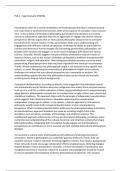PSA 2 – Gigi Emanuels 2788761
Parochialism refers to a narrow-mindedness or limited perspective that is centered around
one's own local or restricted environment, often at the expense of a broader, more inclusive
view. In the context of intercultural philosophy, parochialism can manifest as an overly
narrow or ethnocentric approach that fails to appreciate or engage with diverse cultural
perspectives. Wiredu argues that an intercultural philosopher should strive to overcome
parochialism for several reasons. Firstly, parochialism limits one's understanding and
engagement with different cultural perspectives, hindering the ability to appreciate the
richness and diversity of human thought. By overcoming parochialism, philosophers can
broaden their horizons and engage in a more inclusive dialogue with ideas from various
cultures. Secondly, Wiredu suggests that parochialistic universalism may be a result of
historical factors, such as the success of Western philosophical traditions intertwined with
colonialism, religion, and education. Overcoming parochialism becomes crucial to avoid
perpetuating biased perspectives that may have originated from historical circumstances.
Thirdly, Wiredu emphasizes that philosophical insight is not exclusive to any specific race,
culture, or creed. Recognizing the universality of philosophical insights across cultures
challenges the notion that one cultural perspective has a monopoly on wisdom. This
understanding supports the idea that philosophical ideas can be shared and mutually
enriching across diverse cultural backgrounds.
Conceptual decolonization, according to Wiredu, is the suggestion that individuals should
not automatically accept Western ideas over indigenous ones unless there are good reasons
to do so. It is a call for a critical evaluation of ideas, urging individuals not to unquestioningly
adopt Western philosophical concepts but to consider them in light of their own cultural and
intellectual traditions. This approach aligns with the principle of independent considerations,
which suggests that intellectual choices should be determined by considerations
independent of language or culture. In my opinion, a holistic approach to intercultural
philosophy would involve both conceptual decolonization and an interdisciplinary
perspective. While conceptual decolonization addresses the philosophical ideas themselves,
an interdisciplinary approach broadens the scope by including insights from other
disciplines, such as history, sociology, anthropology, and empirical sciences. This
multifaceted approach enhances the richness of intercultural philosophy, providing a more
comprehensive understanding of the cultural, historical, and empirical contexts that shape
philosophical ideas. Integrating both conceptual decolonization and interdisciplinary
perspectives can contribute to a more nuanced and well-rounded intercultural philosophical
dialogue.
To transcend a cultural sense of philosophical self-sufficiency hindering intercultural
orientation, Western philosophers can undertake practical measures. Firstly, they can
establish inclusive research networks that bring together scholars from diverse backgrounds.
These networks should encourage collaborative efforts on global issues, fostering dialogue
beyond Western-centric perspectives. Secondly, a critical reevaluation of publication and
recognition practices is essential. Criteria for academic acknowledgment should be revised
to ensure equitable representation of diverse philosophical perspectives. This involves





